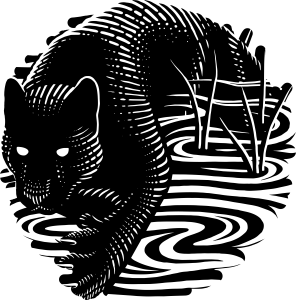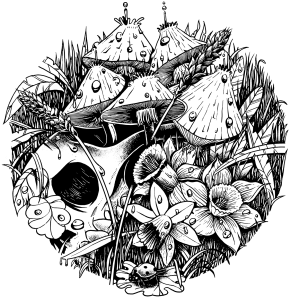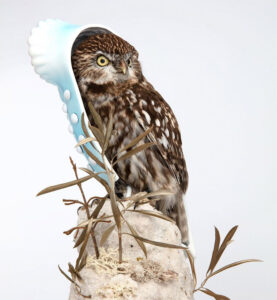
by Jeroen Poelmans
The Ghent artist Joëlle Dubois has already made a name for herself in recent years with her work on new media. In the meantime, she already has a new, deeply personal project in the pipeline and is exhibiting at various art fairs. A conversation about sexuality, the digital world and the future.
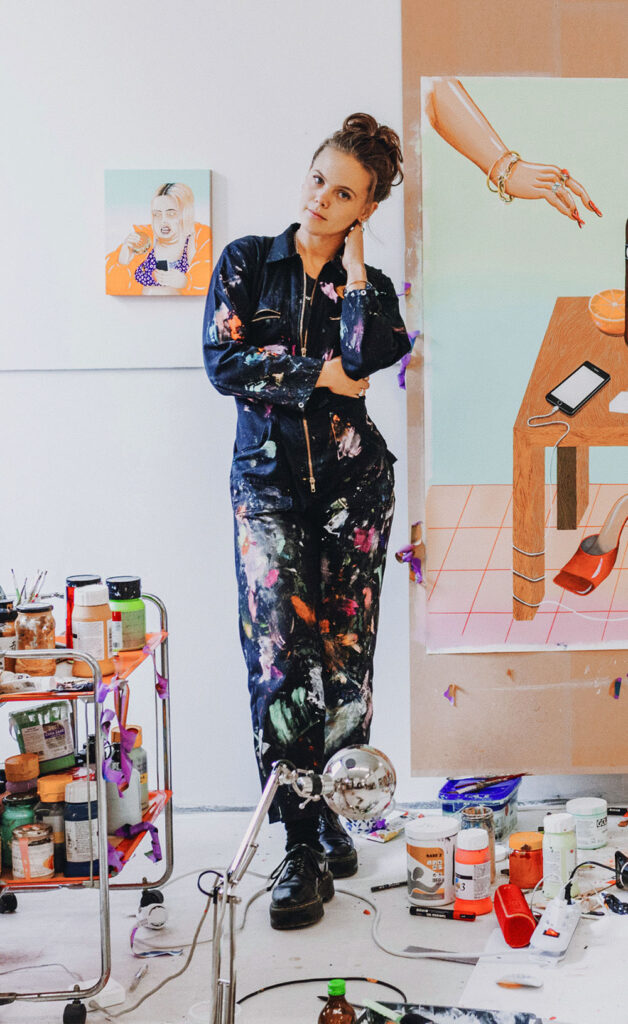
In recent years, you have focused on the duality of social media.
‘Social media is very important to society. It is a hidden addiction: we spend hours online every day, often without knowing it. That is very confronting. I often fall apart when I see my screen times. But that is what makes social media so fascinating. It is inspiring and irritating at the same time. In recent years, I have always put that in the foreground in my work. For a lot of people it's about something recognisable.’
It is striking that in your work you take a nuanced view of the use of social media. You don't speak out about good or bad.
‘You often hear people say that the online generation can no longer live in the now and must always be connected, aware of everything and everyone. That's true, of course. We are addicted to the speed of the Internet. If we are not exposed to the speed of stimuli, we get bored. I have noticed this in myself as well. At the same time, the benefits of social media are undeniable. Just look at how quickly and well we can be informed about global issues, such as #MeToo or bullying. There are two sides to the coin, but the debate around social media is unfortunately often too polarised. In my works I have therefore mainly tried to observe and not criticise or polarize.’
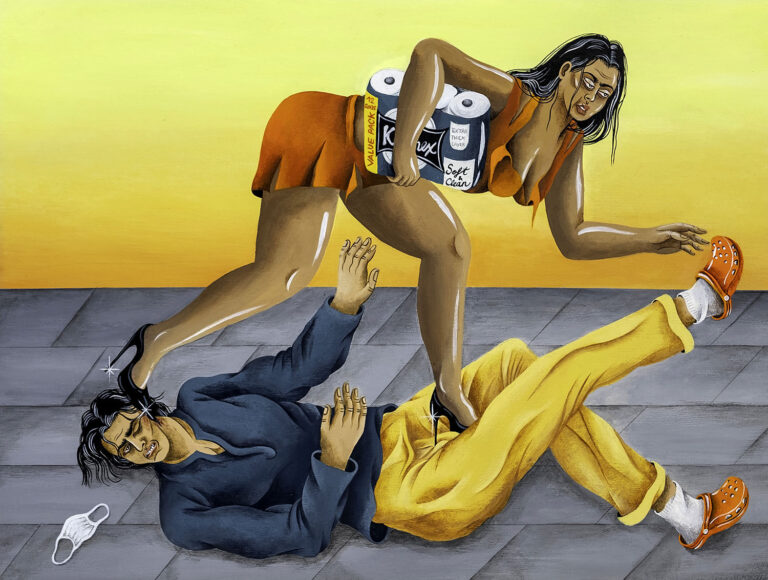
In an interview, you told how you caught yourself glued to your mobile phone during a walk in nature. Are we alienating ourselves from Mother Nature under the influence of new technologies?
‘In a way, perhaps it is. The constant stream of technological stimuli does prevent us from enjoying the moment. Social media are certainly part of it, but other developments also play a role. Just think of the concrete jungle: our cities are being built up at the expense of nature. Or the taboo around breastfeeding in public, which invariably triggers discussions even though it is only natural. Looked at this way, you could say that we are gradually alienating ourselves from the natural. Perhaps that is the price of evolution. After all, we have to move with the times. But it is certainly important to be aware of this.’
In your work, we often see exotic elements à la Paul Gauguin and Henri Rousseau. Is that a form of escapism, to escape the speed of today?
‘The way Gauguin and Rousseau painted is an important source of inspiration, but non-Western art in general has proved especially fascinating. The honesty in those paintings - of the people and for the people, simple and direct - is beautiful. But I would certainly not call my works exotic. That would rather mean that I would want to appropriate the style, which is certainly not the case. Of course I took elements from it, but painting - and art in general - is an eclectic activity that draws inspiration from the craziest corners.’
Another characteristic is the naked woman, who likes to be shown in all shapes and sizes. Sometimes to the point of absurdity.
‘The nudity that you find in many of my works, also now in the design for Yugen, I just see as a pure form of being. After all, everyone has a body. By showing people in this form, with a non-idealised and naked body, I want to step away from sexualisation. I just want to show the vulnerability and diversity that contrasts with the imposed ideal of beauty.’

Does the so-called "male gaze" affect your work?
‘The sexuality of women has not yet been sufficiently normalised and embraced. In that sense, my work is perhaps a statement to that male gaze. Not doing so would just perpetuate the whole current system. But that's really just part of my own idea of self-worth. I have struggled with myself and my own body for a long time. The fact that I paint women and men naked in all their facets, with twisted faces for example, hopefully helps to undermine sexualisation and support self-love.’
Would you call your own work feminist?
‘Feminism is certainly an important element in my art. After all, it is a very important theme that also concerns me. But it is not a goal in itself. I like to link social debates that interest me to personal experiences. A mixture of influences, so to speak. Until now, social media and women have been very important, but soon I will take an even more personal path, for example. I would like to work around my mother, who suffers from Alzheimer's, for example. Mother-daughter relationships will be central, just like my childhood. Something completely different, but that is necessary. As an artist, you have to evolve. If, as an artist, you feel that something is catching on and you become very comfortable with it, then it is time to go in a new direction.’
You are clearly going to make yourself very vulnerable. Isn't that frightening?
‘Absolutely. In my earlier work, I already showed my vulnerability in the form of nudity, but my personal story remained a bit hidden behind the larger social theme. Now I feel ready to take the step to full exposure. That is very frightening, but at the same time therapeutic.’
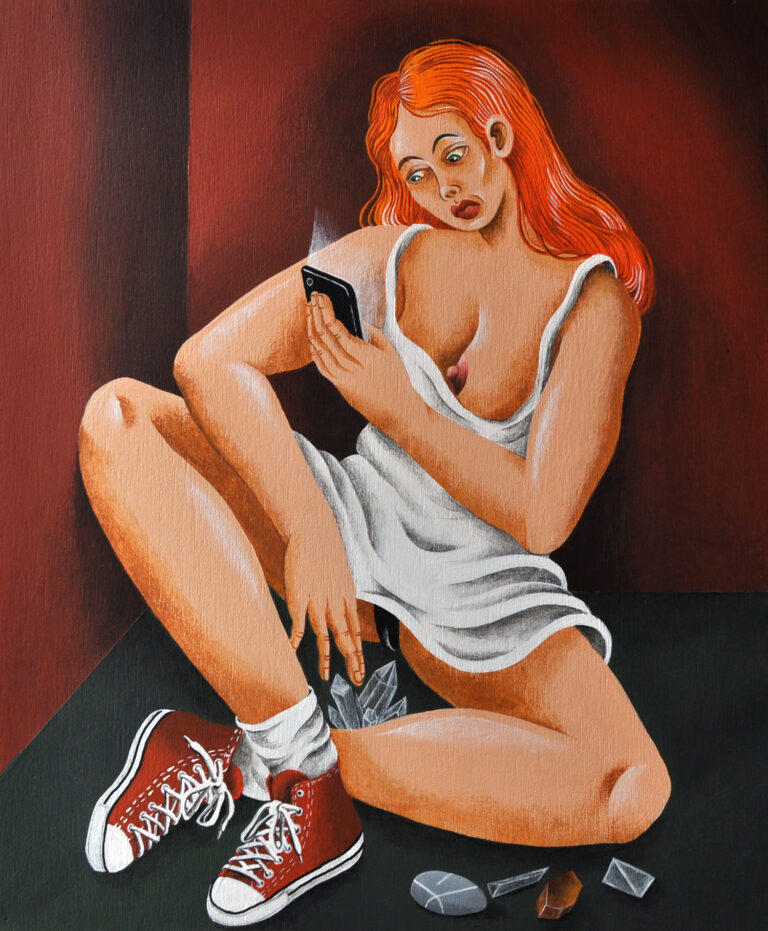
Because you are constantly reflecting on yourself?
‘Indeed. As an artist, you are constantly locked in with yourself. Physically, in your studio, but also mentally. Sometimes that is very hard and lonely and you come up against yourself, but sometimes it is also very inspiring. If you are in the flow, it is even bliss. Then you are in the now and have no sense of time or space. Painting then becomes an action that dominates your whole being, like a place of rest in the middle of a world full of stimuli.’
How do you achieve that flow?
‘I always have to take my shoes off. I have slippers ready as standard (laughs). Having plants around often helps too.’
Can you tell us more about your design for Yugen?
‘I am a big fan of Yugen and found it very interesting to visualise a flavour for once. At the start, I already knew that I wanted to use the strawberry fused with a mushroom (which I link to a scoby) in the drawing, but the rest came quite spontaneously. The "Strawberry Basil" flavour evoked in me a feeling of sweetness, playfulness and sexuality. The mixture is a bit like an aphrodisiac, so I definitely wanted a mysterious and sexually feminine figure. Hence the nymph-like character.’
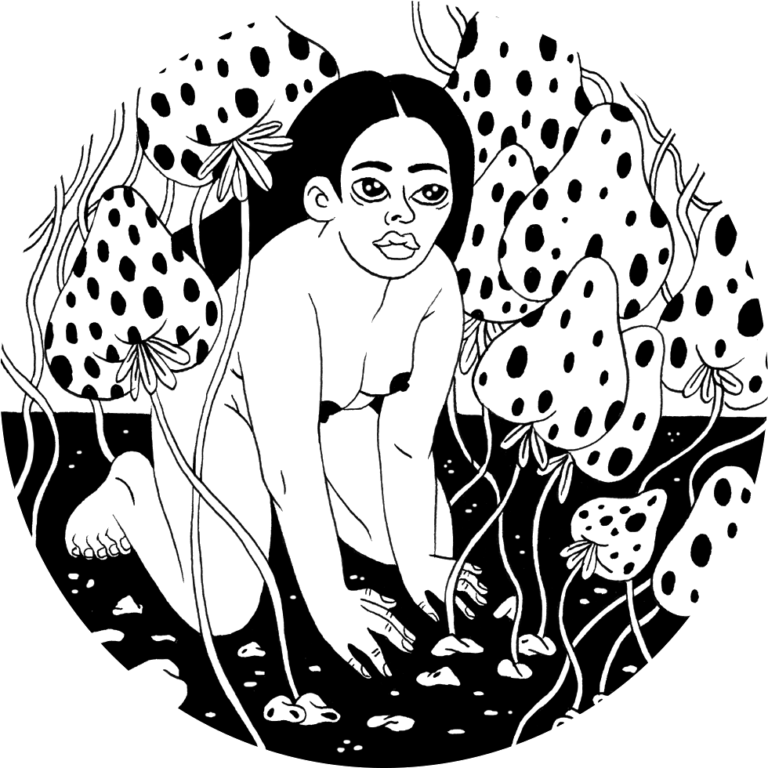
The design ends up on a bottle. Did you go about it in a different way than if you were making a painting?
‘Absolutely. You go about things a bit more simplistically. You are much more limited by the medium, small details quickly become illegible. That's something I had to take into account, because those details are usually very important to me. But I also found the restriction interesting: you are forced to think and work differently.’

Let's raise our glasses to this new flavour, why do we cheer, Joelle? To the playfulness of Mother Nature: Santé!
Joëlle Dubois (website / Instagram)
Joelle Dubois has her second solo exhibition in May 2022 at Thomas Rehbein Gallery in Cologne.
You can find the stories behind the other designs here.
‘
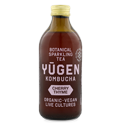 I like Yugen Kombucha
I like Yugen Kombucha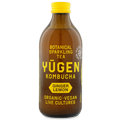
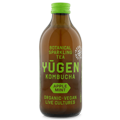 J'adore Yugen Kombucha
J'adore Yugen Kombucha

